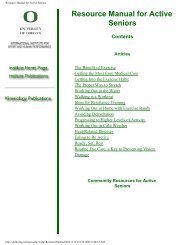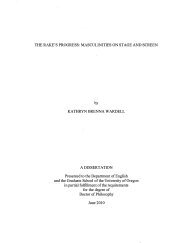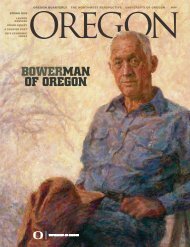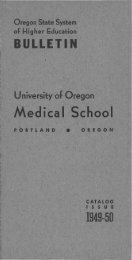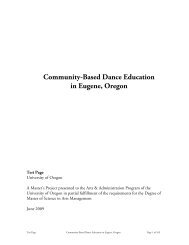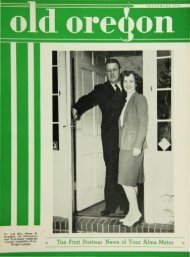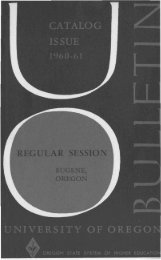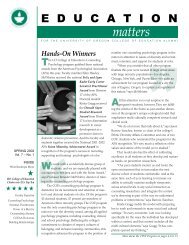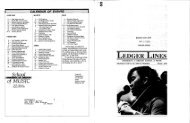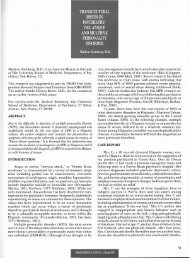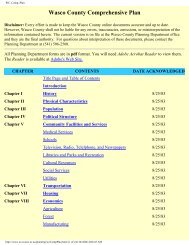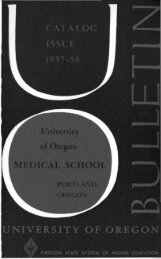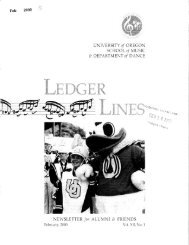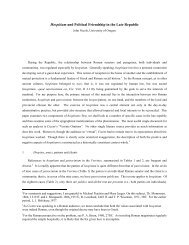~EGULAR SESSION - University of Oregon
~EGULAR SESSION - University of Oregon
~EGULAR SESSION - University of Oregon
Create successful ePaper yourself
Turn your PDF publications into a flip-book with our unique Google optimized e-Paper software.
ENGLISH 153<br />
396, or Eng 420, 421, 422, or AL 101, 102, 103, or the completion <strong>of</strong> any two <strong>of</strong><br />
the following: Eng 301, Eng 303, Eng 304, Eng 305, Eng 430.<br />
For a standard certificate, granted after five years <strong>of</strong> college work, the<br />
student must complete a standard norm: 60 term hours, including the basic-norm<br />
requirement and work in literary criticism.<br />
The Department <strong>of</strong> English will approve a student for teacher training only if<br />
his work in English courses is <strong>of</strong> high quality.<br />
The norm requirements listed above will be mandatory after July 1, 1965.<br />
The minimum subject requirements for students who qualify for certification before<br />
this date are published in the 1962-63 <strong>University</strong> Catalog, page 261.<br />
Honors. See HONORS COLLEGE, pages 120-123.<br />
Graduate Work. The Department <strong>of</strong> English <strong>of</strong>fers graduate work in English<br />
literature, American literature, and linguistics, leading to the Master <strong>of</strong><br />
Arts and Doctor <strong>of</strong> Philosophy degrees, and a graduate program in creative<br />
writing leading to the M.A. or Master <strong>of</strong> Fine Arts degree. A Ph.D. program in<br />
comparative literature, administered by a committee representing the Department<br />
<strong>of</strong> English and the Department <strong>of</strong> Foreign Languages, <strong>of</strong>fers opportunity for<br />
advanced study <strong>of</strong> several literatures in their original languages (see page 145).<br />
Except for candidates in creative writing, a thesis is not required in the M.A.<br />
program. All M.A. candidates take a written examination on a selected list <strong>of</strong><br />
literary works.<br />
The program leading to an M.F.A. in creative writing includes studies in<br />
English and American literature, in aesthetics, and in the history and criticism <strong>of</strong><br />
art, music, and drama, and the production <strong>of</strong> a sustained piece <strong>of</strong> writing <strong>of</strong> high<br />
literary merit.<br />
For the Ph.D. degree, the department recommends an elementary knowledge<br />
<strong>of</strong> Latin or Greek in addition to the required reading knowledge <strong>of</strong> two modern<br />
languages.<br />
Literature<br />
LOWER-DIVISION COURSES<br />
*Eng 52. Corrective Reading. 1 hour any term.<br />
Designed for students who have difficulties in reading at the college level.<br />
Methods for increasing speed and comprehension. Jackson, Willard.<br />
tEng 101, 102, 103. Survey <strong>of</strong> English Literature. 3 hours each term.<br />
Study <strong>of</strong> the principal works <strong>of</strong> English literature based on reading selected to<br />
represent great writers, literary forms, and significant currents <strong>of</strong> thought.<br />
Provides both an introduction to literature and a background that will be useful<br />
in the study <strong>of</strong> other literatures and other fields <strong>of</strong> cultural history. Fall :<br />
Anglo-Saxon beginnings to the Renaissance; winter: Milton to W ordsworth;<br />
spring: Byron to the present. Aho, Aly, Black, Gage, Hansen, Johnson,<br />
Lansdowne, McCloskey, Malarkey, Mortenson, Mundie, Irma Sherwood,<br />
Toelken, Willard.<br />
tEng 104, 105, 106. Introduction to Literature. 3 hours each term.<br />
Study <strong>of</strong> literature and the nature <strong>of</strong> literary experience through the reading<br />
<strong>of</strong> great works <strong>of</strong> prose and poetry, drawn from English and other literatures.<br />
Works representing the principal literary types are read in their entirety when<br />
possible, with emphasis on such elements as structure, style, characterization,<br />
imagery, and symbolism. Bartel, Cadbury, Evans, Gardiner, Hansen, Hastings,<br />
Hodges, Hurt, Hynes, McKnight, Maveety, Nolte, O'Neil, Oswald,<br />
Reither, Salisbury, Stallman, Strange, TOOL<br />
* No-grade course.<br />
t A student may register for only one <strong>of</strong> the three sequences: Eng 101, 102, 103; Eng 104,<br />
105,106; Eng 107,108,109.



